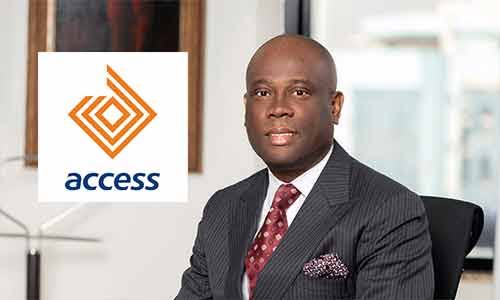Business
Access Bank bridges energy gap with solar partnership

BY EMEKA EJERE
In a bold move to bridge Nigeria’s power supply gap as well as complement the nation’s energy transition efforts, Access Bank Plc, in collaboration with Asolar, has launched a green energy solution to tackle power supply challenges faced by small and medium enterprises (SMEs) and rural communities across Nigeria.
An estimated 85 million Nigerians lack access to electricity, and 176 million people lack clean cooking fuels or technologies. According to SE4All Action Agenda, the country’s power system is characterised by a massive gap between supply and demand.
The current power demand is estimated at 17,520MW, including latent and suppressed demand, against 5,300MW peak generation capability. Despite the 13,000MW installed capacity eight years after the sector was privatised, power generation still hovers just above 5,000 MW.
To bridge this gap, Nigeria plans to generate 30,000MW by 2030, and 3,000MW of the promised increment will be from renewable energy sources to serve its over 200 million people. Renewable energy is touted as one of the ways to bridge the energy supply gap in Nigeria as well as drive sustainable development especially for disadvantaged groups.
The products, which included solar-powered TV sets, Air Conditioners, PoS machines, among many others, were launched at the Access Bank Branch in Garki, Abuja at an unveiling ceremony tagged: ‘Light up your community’.
The initiative is expected to bring succour to owners of SMEs and people living in rural communities with no or little power supply, who spend huge sums in procuring generating sets, purchasing fuel, and the maintenance of generators to operate their business successfully.
The Chief Executive Officer of Global Innovation Learning Lab, Agwu Amogu, recently cited an African Development Bank report which estimates that SMEs in the country spend around $14m every year to purchase diesel for various business needs.
Agwu, who was speaking during the launch of a new book by a former Minister of Finance, Kaku Idika Kalu titled “Tariff and non-tariff policies and impact on industrial development”, also explained that import substitution is a failed policy because Nigeria has not reaped the gains it should have gained from it.
He had said, “In our context in Nigeria, we can clearly see that import substitution has been technically, a failed policy because the value we should derive from it, we have not gotten it. When you do import substitution, there is a tendency to take shortcuts. The efficiency of the industry is weakened and the competitiveness globally is lost.
“We know that $14m is spent annually by SMEs to buy diesel. That is huge. If we can close that gap, our demand for foreign exchange will drop and our competitiveness will increase — evidently, they spend 10 per cent of their profits just on diesel alone.”
Speaking during the launch of the green energy solution, Access Bank Deputy Managing Director, Victor Etuokwu, who was represented by the bank’s Director of Regional services, Neka Adogu, explained that the initiative was aimed at promoting financial inclusion in rural areas.
“This inconsistent power supply poses a substantial challenge for small and medium enterprises as well as initiatives aimed at promoting financial inclusion in rural areas, which is considered a yardstick for economic growth in Nigeria,” he said.
“Currently, in Nigeria, owners of SMEs and people living in rural communities with no or little power supply, spend huge sums in procuring generating sets, purchasing fuel, and the maintenance of generators to operate their business successfully.
“Furthermore, in the broader context of financial inclusion, the absence of power accessibility becomes a critical barrier. Dependable electricity is a fundamental prerequisite for implementing modern financial services like digital banking and payment systems, particularly in underserved rural areas.”
Group Head, Financial Inclusion, Access Bank Plc, Chizoba Iheme, disclosed that the bank has over 300,000 Access agents across the country to facilitate the distribution.
In his remarks, the Chief Executive Officer of Asolar, Hakeem Shagaya, said the company was committed to ensuring every citizen has access to reliable and sustainable energy nationwide.
While appreciating the management of the bank for the collaboration, Mr Shagaya noted that the initiative was in line with the sustainable development goals on clean and renewable energy.
“As we embark on this journey towards Access Green Energy, let us not overlook the profound impact on our environment. This initiative is not just about illuminating homes; it is about lighting the way for a greener and cleaner tomorrow”, he said.
“The positive environmental impact extends beyond emissions reduction, encompassing the preservation of ecosystems, the promotion of biodiversity and the creation of a more sustainable and resilient planet for future generations.”
This is not the tier 1 lender’s first venture into the world of renewable energy. Last year, the bank entered into an agreement to finance a N140m solar power project solution that would cater for sixty percent of the electricity requirement of the Lagos Business School (LBS), under an initiative enabled by a French government development agency (ADF).
LBS had seen its operating cost jump 25 percent mainly on account of the soaring cost of diesel, according to available records. The agreement with Access Bank was to lead to the establishment of a solar power solution in the region of 350khw, a project expected to significantly cut the dependence of LBS on diesel generators.
Implementation was to be led by the Sustainable Use of Natural Resources and Energy Finance (SUNREF), which is part of a broader French government initiative to promote energy efficiency and renewable energy as well as the sustainable use of natural resources.
Charles Ivenso, Chief Operating Officer of LBS had revealed that the school hoped to expand the projection in a year or so to take care of 100% of its power need.
The financing from Access Bank, it was learnt, is at 9 percent, which is 300 basis points below the bank’s prime lending rate for renewable energy projects.








